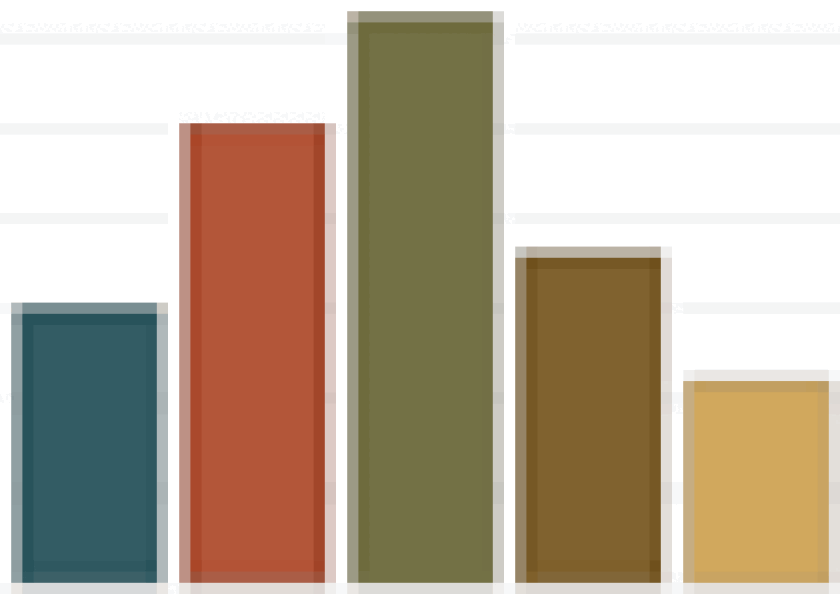IP work is booming in the US. According to provisional results of MIP's first-ever extensive survey of in-house counsel in North America, many companies have increased their IP budgets for both contentious and prosecution work, and similar numbers expect to increase budgets further in the next year. More than a third of respondents so far also expect to expand the size of their in-house IP department over the coming year.
IP trends: provisional findings |
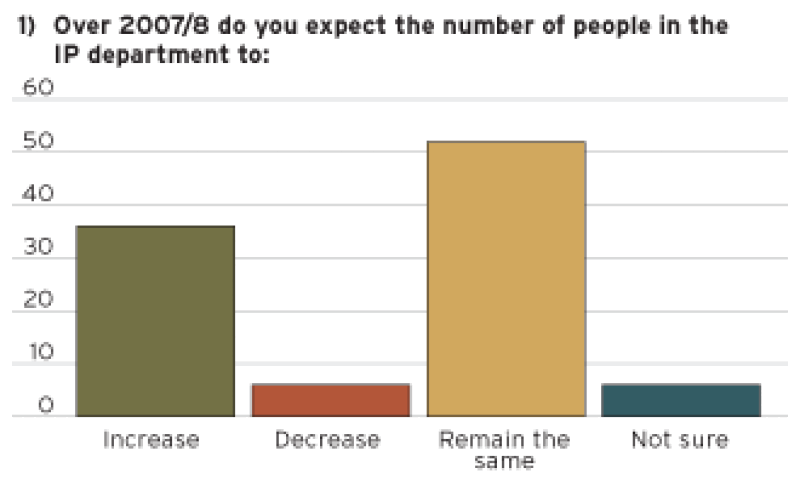
|
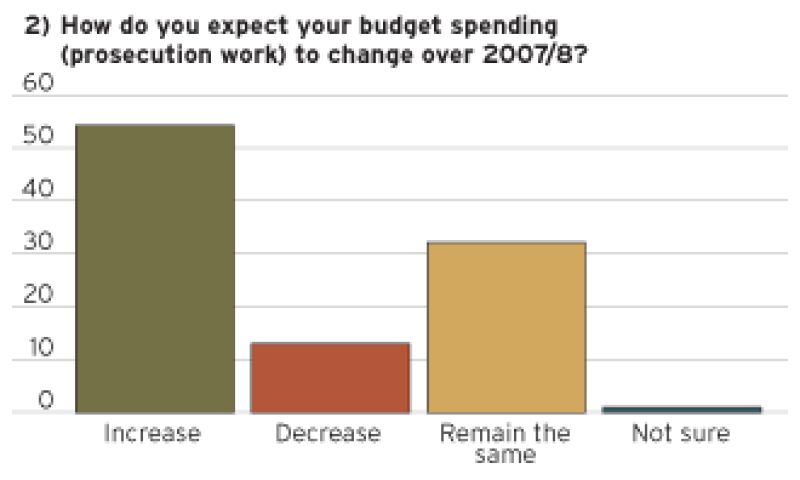
|
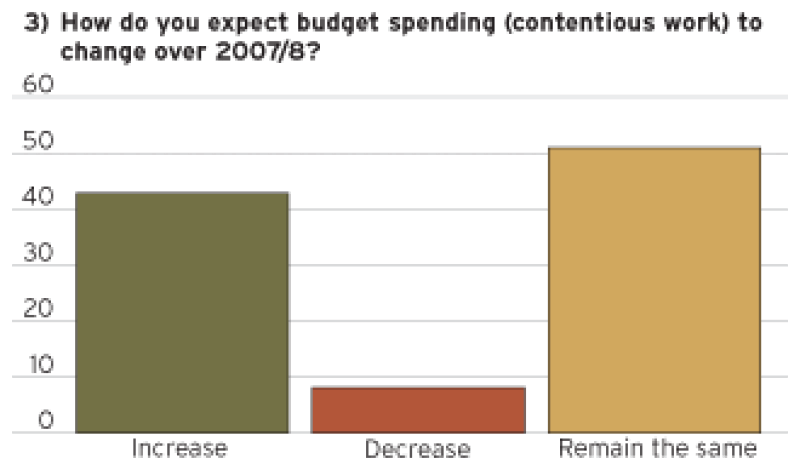
|
The survey, which consists of 29 main questions, is being conducted anonymously by telephone and email. At the time the provisional results were compiled (mid-March), in-house counsel from Fortune 500 companies as well as North American subsidiaries of major European and Asian corporations had been interviewed. Once all the interviews have been completed, the research will provide a unique perspective on broad trends in the IP market as well as detailed feedback on the law firms that in-house counsel use. The results will be published in a special MIP report, called IP Trends, in June 2007. The charts over the next few pages highlight just a few of the key trends emerging based on the interviews already conducted.
SEE MORE: Poll: COVID could push company counsel to monetise more IP
IP work is growing
The vast majority of respondents (88%) either expect their IP department to remain the same size or increase over the next year (see chart 1). In addition, IP departments are seeing budgets increase – in stark contrast to the situation five or so years ago when many companies saw resources cut back.
Asked how budget spending for prosecution work changed in the period 2005/6, 60% reported that it had increased, while 30% said it had remained the same and just 10% said it had decreased. Asked to predict what will happen to their budget in 2007/8, a majority expect it to increase (see chart 2).
In contentious work, the trend is similar but not quite so clear-cut – perhaps reflecting the more unpredictable nature of litigation and related work. For the period 2005/6, 50% said their contentious work budget had remained the same, while slightly fewer (46%) said it had increased and just 4% said it had decreased. Looking ahead, 92% expect the budget to either remain the same or increase (table 3).
But it is not just internally where companies are increasing IP work. One question in the survey asked respondents what work they are considering outsourcing (or increasingly outsourcing) in 2007/8. All but four of the respondents plan to outsource some IP work: of those four, two said they expected outsourced work to remain the same or decrease, one said it was looking at "beefing up" internal resources and one said it wanted to bring trade mark filing in-house.
Of the rest, many report that they outsource, or plan to outsource, most types of IP work. For example, 54% of those that responded said they ask law firms to handle trade mark filing in the US, and 69% said they outsource international trade mark filing.
SEE MORE: In-house survey: Trump takes early edge over Biden on IP
Relations with outside counsel
The IP Trends survey includes a number of questions asking in-house counsel about their relations with outside counsel in general. For example, one question asks if they are satisfied with billing practices for prosecution work and contentious work (charts 4 and 5). The majority are, although a significant minority (more than 1 in 10 in both cases) are dissatisfied. The survey also addresses whether clients prefer hourly billing, fixed fee billing or contingency fees (for litigation).
Respondents were also asked how influential various factors are in selecting firms for both prosecution and contentious work. The factors include: the size/depth of a firm; cost; feedback from peers/colleagues; promptness; international experience; involvement with professional organizations; and ethnic and gender diversity.
The provisional analysis of this question already shows some interesting findings. For example, when instructing firms to do prosecution work, few people rate the size/depth of a firm as a "very influential" factor but promptness when responding to requests is considered "very influential" by half of respondents (chart 6). For contentious work, the overriding factor is expertise, which is rated as "very influential" by 82% of respondents. Feedback from peers/colleagues is seen as an influential factor, but having multiple offices is not: a quarter of those interviewed said it is "not influential at all" (chart 7).
Other topics covered in this part of the survey include whether clients have stayed loyal to individual partners who have moved firms, what their main problems have been when working with outside counsel, how outside counsel can improve their services and how often they review the firms they use. Detailed results from this section, covering all these issues, will be published in IP Trends.
IP trends: provisional findings |
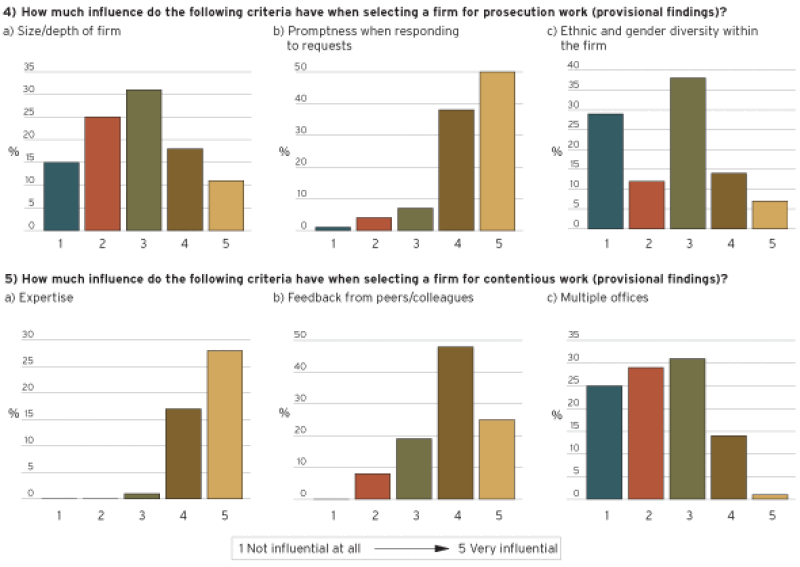
|
Opinions of outside counsel
The final question in the IP Trends poll asks clients to identify up to five firms with which they work, and to provide detailed feedback on each one. They are invited to rate each firm on a scale of 1 (poor) up to 5 (excellent) for criteria including expertise, cost, reputation, business understanding, level of personal contact and speed of response. A snapshot of these findings will be published in IP Trends, with the detailed comments on particular firms available as optional appendices. The box lists those firms for which extensive feedback has already been received.
These are just a few of the many topics covered in the research for IP Trends, which promises to be essential reading for in-house counsel, lawyers in private practice and those in associated areas such as recruitment and marketing. There are also questions about work in other jurisdictions, such as: do you hire firms outside the US and Canada, or do you rely on your local counsel to refer? Who decided the appointment of international outside counsel? and in which jurisdictions do you have most difficulty hiring high-quality firms?
IP Trends: methodology |
When it is published in June this year, IP Trends will be the first comprehensive survey of in-house IP counsel in the Americas. It will cover issues such as IP counsel's work, budgets and priorities, as well as details of the work they outsource, how they decide which outside firms to use, which factors are important in selecting firms, how often outside firms are reviewed, how outside counsel can improve and their preferred billing practices. All the in-house counsel have also been invited to give detailed feedback on up to five outside firms that they work with. This feedback covers issues such as expertise, cost, reputation, business understanding, speed, level of personal contact and staffing levels. The IP Trends survey is based on a 29-question survey that is specifically targeted at in-house counsel. The survey is available for in-house counsel to complete online at www.managingip.com/iptrends. In addition, MIP's staff have contacted specially selected senior counsel by phone to conduct interviews covering all the questions in the survey. When it is completed, IP Trends will include feedback from more than 100 in-house counsel who handle work in the Americas. It will be published as a special report in June, and all in-house counsel who have taken part will receive a free copy. Copies will also be available for sale, as will special editions including appendices with detailed information on particular firms. |
A selection of firms that have received multiple mentions from respondents so far: |
||
Baker Botts Baker & McKenzie Brinks Hofer Gilson & Lione Connolly Bove Lodge & Hutz Dimock Stratton Fenwick & West Finnegan Henderson Fish & Richardson Fitzpatrick Cella Harper & Scinto Foley & Lardner |
Fulbright & Jaworski Goodwin Procter Gowlings Greenberg Traurig Heller Ehrman Hogan & Hartson Howrey Jones Day Kaye Scholer Kilpatrick Stockton |
Knobbe Martens Latham & Watkins Loeb & Loeb Morgan Lewis Morrison & Foerster Paul Hastings Proskauer Rose White & Case Wilmer Hale |
Who has responded so far? |
Research for IP Trends targeted big companies, and especially those with significant IP assets, in the US and Canada. Most have considerable IP resources; 25% reported that they have at least 30 people in their in-house team globally. The most popular industries covered are healthcare and biotechnology (17%), pharmaceuticals (8%), industrial/manufacturing (19%) and telecoms/technology (20%). The job titles of those responding include general counsel, chief IP counsel, head of IP, director of legal affairs, senior counsel and vice president – legal. |
